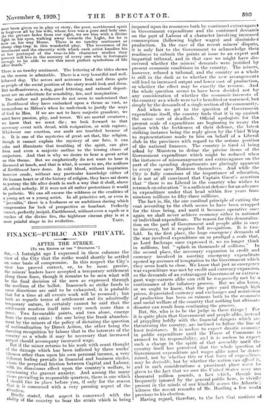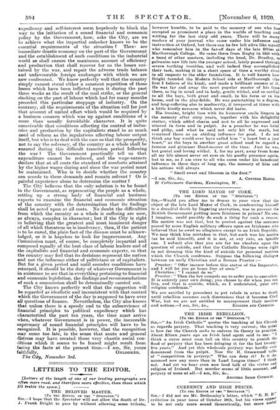FINANCE—PUBLIC AND PRIVATE.
AFTER THE STRIKE.
(To THE EDITOR OF THE " SPECTLT071."3
SER,-A fortnight ago I expressed in these columns the view of the City that the strike would shortly be settled on some basis of compromise. In this respect the City's view has proved correct, or, to be more precise, the miners' leaders have accepted a temporary settlement along those lines, though it remains to be seen what will he the final decision of the men as expressed. through the medium of the ballot. Inasmuch as strike funds in some directions are said to be exhausted, it is probable that for a time at all events work will be resumed ; but both as regards terms of settlement and its admittedly temporary nature, it certainly cannot be said that the settlement resolves itself into very much more than a truce. Two favourable points, and two alone, emerge from the recent crisis : the one being the frank abandon- ment by the miners of the policy of dictating the question of nationalization by Direct Action, the other being the dawning recognition by labour that in the interests of the country as a whole it may be necessary that increased output should accompany increased wage. But if the miner returns to his work with scant thought of the damage which has been inflicted by three weeks' Idleness other than upon his own personal income, a very different feeling prevails in financial and business circles, where the perpetual friction between Capital and Labour, with its disastrous effect upon the country's welfare, is occasioningthe gravest anxiety. And among the many 'lea's prevailing in responsible quarters, there is one which I should like to place before you, if only for the reason that it is concerned with a very pressing aspect of the situation. Briellir stated, that aspect is concerned with the Ability of the country to bear the strain which is being imposed upon its resources both by continued extravagant.. in Government expenditure and the continued demands
on the part of Labour of a character involving increased consumption (following higher wages) and diminished production. In the case of the recent miners' dispute, it is only fair to the Government to acknowledge their readiness to submit the points at issue to an expert and impartial tribunal, and in that CIISO we might have dis- covered whether the miners' demands were justified by
present economic conditions in the country. The miners, however, refused a tribunal, and the country as a whole is still in the dark as to whether the new arrangements will lead to increased output and lower cost of production, or whether the effect may be exactly the reverse. And the whole question seems to have been decided not by any consideration of whether the economic interests of the country sea whole were to he benefited or worsened, but simply by the demands of a single section of the community.
And when we get to the question of Government expenditure itself, the country finds that it is up against the same sort of deadlock. Official apologists for the present scale of expenditure are beginning to weary the nation with the feebleness of their defence, the latest striking instance being the reply given by the Chief Whip to representations made to hint on behalf of a Liberal club in the provinces with regard to the serious position of the national finances. The country is tired of being asked by Ministers to define the precise items of the Government expenditure which might be reduced when the instances of mismanagement and extravagance on the part of the spending departments are glaringly apparent to every one save Ministers themselves. And while the City is fully conscious of the importance of education, it Is not at all convinced that Captain Guest's assertion that "there is no Liberal in the country who wishes to retrench on education " is a sufficient defence for an advance in expenditure under that head within five years from nineteen millions to fifty-three millions. The fact is, Sir, the one cardinal principle of cutting the coat according to the cloth seems to have been scrapped for the time being, and until it becomes operative once again we shall never achieve economy either in national or individual expenditure. The reason for this demoraliza- tion on the part of Government and people alike is easy to discover, but it requires full recognition. It is two- fold. In the first place, the huge emergency dementia of the war involved expenditure on so prodigal a scale that, as Lord Inchcape once expressed it, we no longer think in millions, but "splash in thousands of millions." In the second place, the necessary expansion in credit. and currency involved. in meeting emergency expenditure opened up avenues of temptation to the Government which they seem loath to close. We know that just as emergency war expenditure was met by credit and currency expansion, so the demands of an extravagant Government or extrava- gant wage-earners alike can ;till be temporarily met by a continuance of the inflatory process. But we also know, or we ought to know, that the price paid through high prices, depreciated currency and exchanges and restriction of production has been so ruinous both to the economic, and social welfare of the country that nothing but ultimate disaster can result from continuing the process.
But, Sir, who is to be the judge in these things ? For it is quite plain that Government and people alike, instead of grappling boldly with the financial clangers which are threatening the country, are inclined to follow the line of least resistance. It is useless to expect drastic economy in public expenditure until the House of Commons is aroused to its responsibility, and it is useless to expect such a change in the spirit of that assembly until the country itself has perceived that the whole question of Government expenditure and wages alike must be deter- mined, not by whether this or that form of expendituri may be desirable, but by whether the nation can afford it, and in such considerations a prominent place must be given to the fact that we owe the United States over one thousand million pounds, a fact which, though too frequently ignored by the general public here, is vividly present in the minds of our kinsfolk across the Atlantic ; witness the recent remarks of Mr. Harding a few week* previous to his election. Having regard, therefore, to the fact that motives of
expediency and self-interest seem hopelessly to block the way to the initiation of a sound financial and economic policy by the Government, how, asks the City, are we to achieve what the impartial onlooker knows to be the essential requirements of the situation ? These are immediate drastic economy on the part of the Government and the establishment of such conditions in the industrial world as shall ensure the maximum amount of efficiency and production that shall recover for us the losses sus- tained by the war, and repair the adverse trade balance and unfavourable foreign exchanges with which we are now confronted. We know perfectly well that the country simply cannot stand either a constant repetition of those losses which have been inflicted upon it during the past three weeks as the result of the coal strike, or the general slacking on the part of labour which had for many months preceded this particular stoppage of industry. On the contrary, all the requirements of the situation call for just that amount of united effort which would be required by a business concern which was up against conditions of a more than usually formidable character. It is quite conceivable that conditions affecting the control of indus- tries and production by the capitalists stand in as much need of reform as the regulations affecting labour output itself, but who is to deal with the case so that the prosperity, not to say the solvency, of the country as a whole shall be ensured during this difficult transition period following the war ? The Government practically tell us that expenditure cannot be reduced, and the wage-earners declare that at all costa the standard of comforts attained by the higher wages during and since the war period must be maintained. Who is to decide whether the country can accede to these demands and remain solvent ? Or is painful experience alone to determine the matter ? The City believes that the only solution is to be found in the Government, as representing the people as a whole, setting up a strong body of financial and business experts to examine the financial and economic situation of the country with the determination that its findings shall be acted upon at all costs. No doubt the difficulties from which the country as a whole is suffering are now, as always, complex in character ; but if the City is right in believing that the greatest and most imminent danger of all which threatens us is insolvency, then, if the patient is to be cured, the plain fact of the disease must be acknow- ledged, or it is hopeless to look for improvement. Any Commission must, of course, be completely impartial and composed equally of the best class of labour leaders and of the capitalists and financial and economic experts, so that the country may feel that its decisions represent the nation and not the influence either of politicians or of capitalists. But for a given period and until sounder conditions have returned, it should be the duty of whatever Government is in existence to see that in everything pertaining to financial and economic legislation, the findings and recommendations of such a commission shall be determinedly carried out. The City knows perfectly well that the suggestion will be regarded as idealistic and inconsistent with that control which the Government of the day is supposed to have over all questions of finance. Nevertheless, the City also knows that unless there is a speedy end to the subservience of financial principles to political expediency which has characterized the past ten years, the time must arrive when, whatever Government is in power, the inexorable supremacy of sound financial principles will have to be recognized. It is possible, however, that the recognition may come too late, in the sense that acute and general distress may have created those very chaotic social con- ditions which it seems to be feared might result from facing the facts at the present time.—I am, Sir, yours







































 Previous page
Previous page